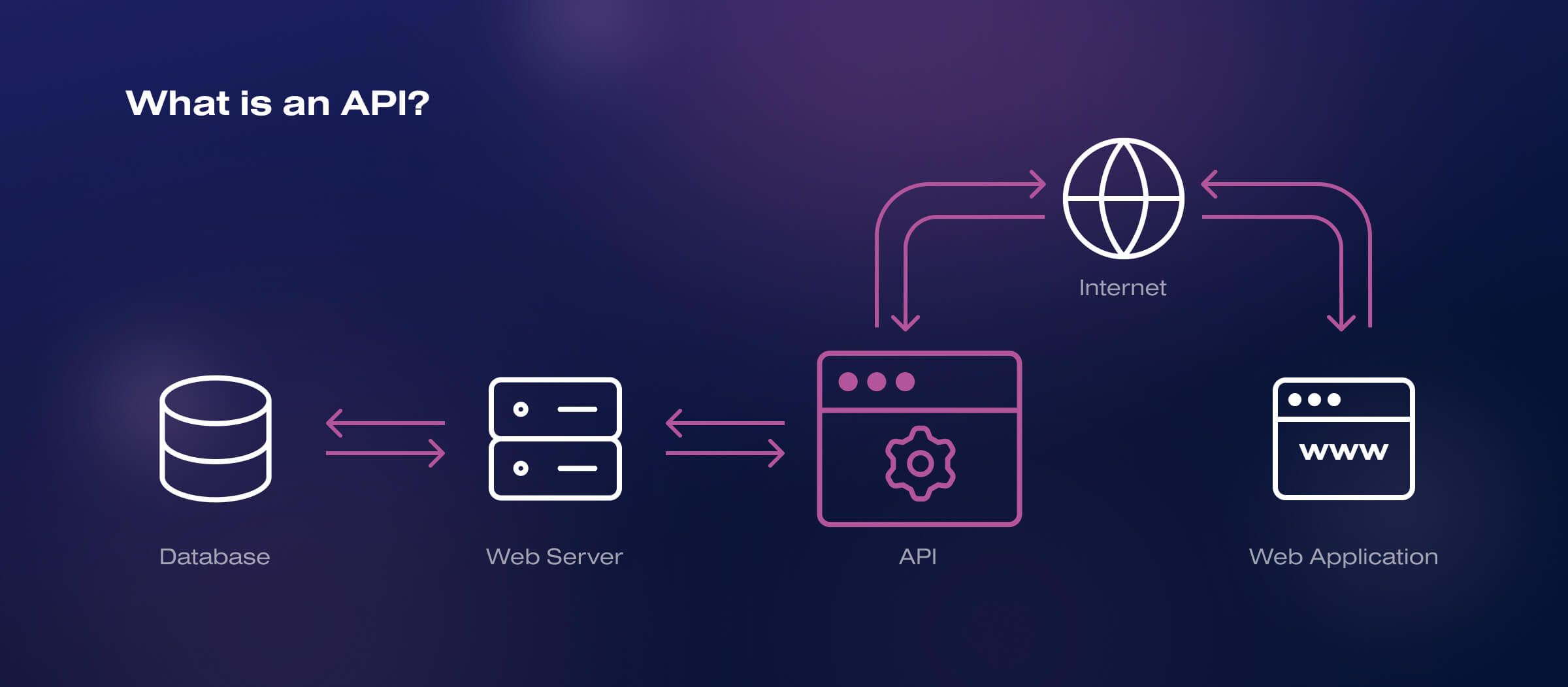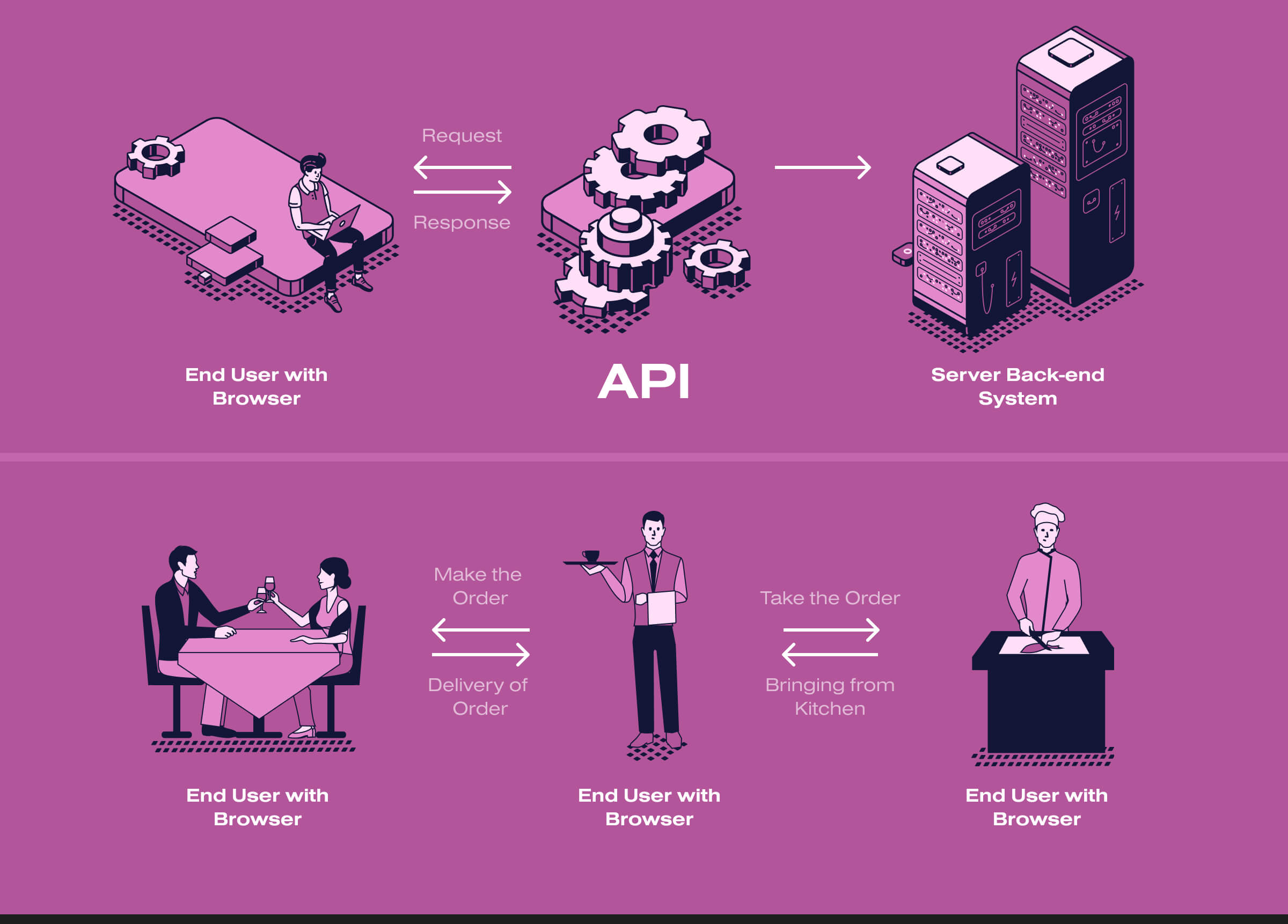In today’s fast-paced digital economy, e-commerce businesses must stay agile and adapt quickly to changing customer demands and market trends. E-commerce companies rely on various tools and technologies to streamline operations, enhance customer experiences, and drive sales. One such powerful tool is API, which allows different systems and applications to communicate and exchange data seamlessly.
This article will discuss the benefits of using e-commerce APIs, the types of APIs architecture, and how businesses can use e-commerce APIs.
Key points
What are e-commerce APIs?

E-commerce API (Application Programming Interface) is a set of ways (procedures, functions, classes, structures) through which an e-commerce website or app communicates with third-party software. For example, it exchanges data for better analytics, allows payment processing, etc.
In simple words, an e-commerce API is a “layer” between 2 different systems. Thanks to this “intermediate layer”, systems exchange data and perform various functions.
APIs come in 2 varieties:
- Public. Public APIs are designed to be shared with the outside world. As an example, the YouTube API. You can use the functionality of services with a public API on your e-commerce website.
- Private. Private APIs are created for a specific group of users and are not available to the general public. Among them, we can distinguish internal (used by company specialists to solve internal tasks) and partner APIs (created for partners and customers of the company to solve various tasks).
Below are 2 examples of when it is impossible to deal without API.
Registration and authorization on the e-commerce website
The standard registration procedure looks like this:
- Person specifies his or her e-mail address
- Person creates a password
- Person confirms the e-mail address
- Person starts using all the features of the e-commerce website
The authorization procedure is almost the same – a person must enter his or her login (for example, e-mail) and password specified during registration. It seems that there is nothing difficult. But it is quite long and tedious.
It is much easier to register and authorize in one click, for example, using a social account. The e-commerce website sends an API request through which it can get all the data necessary for a person`s identification. And he or she does not have to enter anything, confirm and remember. All the person has to do is click the button on the selected social network.
E-commerce aggregator website
Using API, the website collects information from several websites and provides it to the client conveniently within its own page.
A great example is Hotline. To find the cheapest smartphone, there is no need to explore several e-commerce websites, search for the available models, and manually compare prices. A person only needs to enter the smartphone model and price at Hotline, and the system will gather all the available information from several websites, saving a lot of time.
Benefits of using e-commerce APIs

We highlight 4 benefits of using APIs for your e-commerce business:
- Functions extension. You don’t need to develop your own software product specifically for your e-commerce business because you can use an existing one.
- Linking systems. API allows you to connect different systems, for example, accounts of different services, bank accounts, and payment systems.
- Data security. Since some functions are moved into a separate API, incorrect use is impossible.
- Reducing the cost of software products. APIs save the time, money, and labor of specialists.
The developers determine the general list of functions that the specific API provides. For example, with some APIs, you can embed videos from YouTube or maps from Google on your website.
What are the types of APIs architecture and their differences?

We highlight 3 of the most popular API architecture types. Each of them with different purposes and use cases:
- RESTful APIs (Representational State Transfer). RESTful APIs use HTTP protocols to perform operations on resources represented as URLs. They follow a client-server architecture. The client makes HTTP requests, and the server responds with data in a format such as JSON or XML. RESTful APIs are simple, scalable, and widely used for web services. Examples of RESTful APIs include Twitter API, Facebook Graph API, and Google Maps API.
- SOAP APIs (Simple Object Access Protocol). SOAP APIs use the SOAP protocol to exchange structured data in XML format. They define rules for message formatting, error handling, and communication between applications. SOAP APIs are typically used in enterprise-level applications and follow a more rigid structure than RESTful APIs. Examples of SOAP APIs include the Salesforce API, Microsoft Dynamics 365 API, and Amazon Web Services (AWS) API.
- GraphQL APIs. GraphQL APIs use the GraphQL query language to enable clients to request exactly the data they need and nothing more. GraphQL APIs provide a more flexible and efficient way of querying data than RESTful APIs, as they allow clients to specify the shape and structure of the response. Examples of GraphQL APIs include the GitHub GraphQL API, Shopify API, and Yelp GraphQL API.
Choosing the right API architecture type depends on the online store`s requirements and the desired functionality.
How SoloWay Tech can help with e-commerce APIs

At SoloWay Tech, we can provide various services related to e-commerce APIs and system integrations. We can help you with
- API Development. We can develop custom APIs tailored to an e-commerce business’s specific needs. We mean designing and implementing APIs that enable seamless communication between different systems or applications, such as e-commerce platforms, payment gateways, inventory management systems, and CRM systems. For example, we can develop a custom API that integrates an e-commerce platform with a third-party logistics (3PL) provider to automate order fulfillment, tracking, and inventory management.
- API integration. We can integrate existing APIs into an e-commerce system to enable connectivity and data exchange between different systems. This includes integrating third-party APIs, such as payment gateways, shipping carriers, and marketing tools, with an e-commerce platform to streamline business processes and enhance functionality. For example, our team can integrate POS, such as eHopper POS, Lightspeed POS, or Clover.
- API support. Our developers can provide ongoing support for API-related issues and updates to ensure smooth operation and continued functionality. For example, we can provide detailed API documentation and offer 24/7 support for an e-commerce API, assisting businesses in troubleshooting and resolving any issues that may arise.
We provide a full range of e-commerce services and have many case studies with approved niche expertise. Our team can scale up quickly, while our organized processes allow us to start working on the project almost immediately.
How businesses can use e-commerce APIs
Businesses can leverage e-commerce APIs to streamline operations, enhance customer experiences, and drive revenue growth. Here are 10 examples of how businesses can use e-commerce APIs:
- Online store integration. Businesses can integrate e-commerce APIs into their online stores to enable features such as product catalog management, shopping cart functionality, checkout processes, and order management. This allows businesses to create seamless and efficient online shopping experiences for their customers.
- Payment processing. By integrating with e-commerce APIs of payment gateways or processors, online stores can handle transactions, manage refunds, and ensure secure and compliant payment processing.
- Shipping and logistics. E-commerce APIs can facilitate integration with shipping and logistics providers, allowing businesses to automate shipping processes, generate shipping labels, track shipments, and calculate shipping costs. This helps optimize order fulfillment and streamline shipping operations.
- Inventory management. Businesses can use e-commerce APIs to manage inventory levels, update product availability, and track stock levels in real-time. This helps businesses maintain accurate inventory information, prevent overselling or stockouts, and optimize their supply chain operations.
- Customer management. E-commerce APIs can enable businesses to manage customer information, such as user accounts, profiles, and order history. This allows e-commerce websites to provide personalized experiences, offer customer loyalty programs, and provide efficient customer support.
- Marketing and promotion. E-commerce APIs can enable businesses to create and manage promotions, discounts, and coupon codes, as well as manage marketing campaigns, track conversion rates, and analyze customer behavior. This helps e-commerce websites drive sales, optimize marketing efforts, and improve customer engagement.
- Analytics and reporting. E-commerce APIs can provide businesses access to data and analytics on sales, customer behavior, and other key metrics. This allows businesses to gain insights into their e-commerce performance, make data-driven decisions, and optimize their strategies for growth.
- Multi-channel selling. E-commerce APIs can facilitate multi-channel selling by enabling businesses to sell products across various online marketplaces, social media platforms, and other channels. This helps businesses expand their reach and increase sales.
- Customization and extensions. Many e-commerce APIs allow businesses to customize and extend their online stores with additional functionality, such as custom payment gateways, custom product types, and custom workflows. This enables businesses to tailor their e-commerce solutions to their specific needs and requirements.
- Third-party integrations. E-commerce APIs can facilitate integration with third-party services, such as CRM (customer relationships management) systems, email marketing platforms, analytics tools, and other business applications. This allows businesses to automate data exchange between different systems, streamline workflows, and enhance business processes. For example, businesses can use an e-commerce API to automatically sync customer data with their CRM system, trigger targeted email campaigns based on purchase history, or analyze data in their analytics tool to gain insights into customer behavior and preferences.
E-commerce APIs can be utilized by businesses to integrate with a wide range of third-party services, enabling them to automate processes, enhance data exchange, and optimize their overall business operations. We at Soloway Tech can help you with e-commerce API development or integration.
Conclusion
You need a strong e-commerce solutions development team for API development or integration. We at Soloway Tech are those who you are looking for. We can also help you develop and customize a unique e-commerce platform from scratch or based on existing platforms (Shopify, Magento, WooCommerce).
If you need a reliable e-commerce solutions development partner, we are ready to help you. Contact us right now to discuss your project tomorrow.





